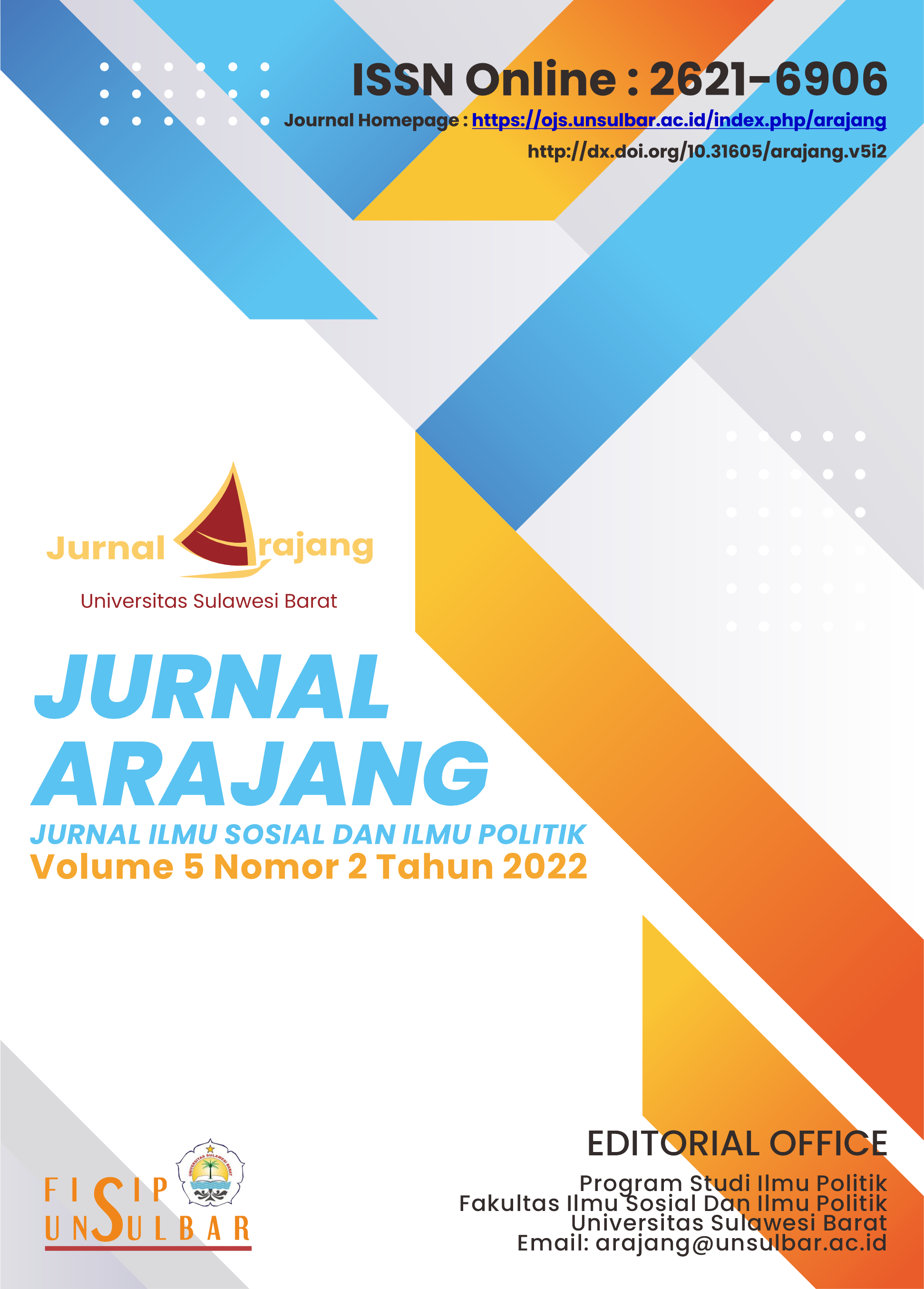THE IMPACT OF FOREIGN DEBT ON IMPLEMENTATION OF INDONESIA'S FOREIGN POLICY 2014-2022
Abstract
A country's foreign debt is aimed at maintaining economic growth. However, in practice, it also affects bilateral relations and international behavior. Indonesia has accumulated foreign debt reaching Rp 7000 trillion from various countries and institutions. This study aims to examine the impact of foreign debt on Indonesia's foreign policy during Joko Widodo's administration from 2014-2022. The study uses a qualitative approach, with data collected through interviews of government officials and academics as well as analysis of document sources. This research uses the concepts of foreign debt, foreign policy, and complex interdependence. The results showed three patterns of Indonesia's foreign relations with debtor countries. First, Indonesia establishes positive relationships with debtor countries. Second, Indonesia avoids getting involved in conflicts with cricket-giving countries on a number of bilateral issues. Third, Indonesia is reluctant to criticize creditors involved in bilateral and international issues while carrying out free and active foreign policy.
References
Armstrong, A.G. (1981). The Political Consequences of Economic Dependence. Journal of Conflict Resolution, 25, 401 - 428.
Bacescu-Carbunaru, A., & Condruz-Bacescu, M. (2012). Dependence Of Country Risk Compared to The Foreign Debt Level. Romanian Statistical Review, 60(10), 57-67.
Balassa, B. (1985). The problem of the debt in developing countries. In Change and Challenge in the World Economy (pp. 102-127). Palgrave Macmillan: London.
Boeije, Hennie. (2010). Analysis in Qualitative Research. Los Angeles: Sage.
Chess, Wibowo. (2012). Analysis Factors Affecting The Government of Indonesia's External Debt 1990-2009. Thesis. Faculty of Economics, Sebelas Maret University, Surakarta.
Colombo, E., & Longoni, E. (2009). The politics of external debt in developing countries. University of Milan Department of Economics Working Paper Series, 176, 1-22.
Creswell, John. (2014). Research Design: Qualitative, Quantitative and Mixed Methods Approaches. Los Angeles: Sage.
Darmayadi, A., & Purnamasari, E. N. (2022). Indonesia – China Relations in the Natuna Sea Dispute Resolution: Struggle for Sovereignty. Journal of Eastern European and Central Asian Research, 9(1), 41–48. https://doi.org/10.15549/jeecar.v9i1.870.
Desker, B. (2022). Singapore-Indonesia Ties: Renewed Deal for A New Age. RSIS Commentary. No 007. 26 January 2022.
Dietrich, Simone. (2021). Countries, Markets, and Foreign Aid. Cambridge: Cambridge University Press.
Gangte, Lammuansiam. (2020). The debt-trap diplomacy revisited: A case study on sri Lanka's hambantota port. Artha Journal of Social Sciences, 19(2), 53-66. doi:https://doi.org/10.12724/ajss.53.4.
Geamănu, M., & Popescu, B.B. (2013). Analysis of Romania's external debt and the implications for foreign relations during 2000-2013. Annals of Spiru Haret University Economic Series, 4, 61-67.
Gustavsson, J. (1999). How should we study foreign policy change?. Cooperation and Conflict, 34(1), 73-95.
Hermann, Charles F. (1990). Changing Course: When Governments Choose to Redirect Foreign Policy. International Studies Quarterly.34, 3-21.
Hey, J.A. (1993). Foreign Policy Options under Dependence: A Theoretical Evaluation with Evidence from Ecuador. Journal of Latin American Studies, 25, 543 - 574.
Holsti,KJ. (1992). International Politics: A Framework for Analysis. Englewood Cliffs, NJ: Prentice-Hall.
Ibrahim, S. G., Mato, K., & Wader, M. The Paradox Of Foreign Debt To Third World Nations In International Politics: A Rationale For Perpetual Dependency.
Inkiriwang, F. W. (2020). The dynamic of the US–Indonesia defence relations: the 'IMET ban'period. Australian Journal of International Affairs, 74(4), 377-393.
Jeanne A.K. Hey (1993). Foreign Policy Options under Dependence: A Theoretical Evaluation with Evidence from Ecuador. Journal of Latin American Studies. 25, pp 543-574 doi:10.1017/S0022216X00006660.
Junaedi, D., Norman, E., Salistia, F., Arsyad, M. R., & Paramansyah, A. (2022). The Analysis of the Impact of Debt on the Indonesian Economy for the Period 1976-2021. ManBiz: Journal of Management and Business, 1(1), 1-18.
Karimah, S. (2020). The Threshold of External Debt Ratio in Indonesia. Journal of Business and Political Economy: Biannual Review of The Indonesian Economy, 2(1), 99-111.
Keohane and Joseph Nye. (1977). Power and Interdependence: World Politics. Boston: Little, Brown and Company.
Kristiadi, R. (2021). The Effect of the China - United States Trade War on Indonesia's Trade Relations with the United States. Journal of Politico, 10(4).
Kurnianingsih, F., Mahadiansar, M., & Adhayanto, O. (2022). Travel Corridor
Arrangement Application Process by Governments of Indonesia and Singapore. Jurnal Bina Praja: Journal of Home Affairs Governance, 14(2), 263-274.
Kusumasari, D. (2020). External debt of Indonesia : From debt-led growth to growth-led debt ? Jurnal Ekonomi Pembangunan, 18 (June), 21–30.
Lamont, Christopher.(2014). Research Methods in International Relations. London: Sage.
Laksmana, E. (2018, October). Are military assistance programs important for
US–Indonesia ties. East Asia Forum. (Vol. 2).
Navalino, R. D. A. (2022). Military-Industrial Complex on Indonesian Defense Industry Cooperation–South Korea to Support The Defense Economy. Budapest International Research and Critics Institute (BIRCI-Journal): Humanities and Social Sciences, 5(3), 20905-20911.
Nazamuddin, B. S., Wahyuni, S. S., Fakhruddin, F., & Fitriyani, F. (2022). The nexus between foreign exchange and external debt in Indonesia: evidence from linear and nonlinear ARDL approaches. Journal of the Asia Pacific Economy, 1-27.
Nugraha, Ogi Nanda Raka Ade Candra, Arum Pramesti Wirawati Muhammad Erwan Syah, Danang Prasetyo,Frega Ferdinand Wenas Inkiriwang. (2022). Diplomatic Bluff against Indonesia's G20 Presidency amid the Ukraine - Russia Conflict: A View from Political Psychology. Papua Journal of Diplomacy and International Relations .Volume 2, Issue 2, November 2022 (123-141).
Picard, Louis A and Robert Groelsema. (2015). US Foreign Aid Priorities: Goals for the Twenty-First Century. In Foreign Aid and Foreign Policy Lessons for the Next Half-Century. Edited by Louis A. Picard Robert Groelsem and Terry F. Buss. London: Routledge.
Sitepu, V. M. (2021). The Effect of Foreign Direct Investment and External Debt on Economic Growth in Indonesia. International Journal on Social Science, Economics and Art, 11(2), 78-82.
Rangkuty, D. M., & Hidayat, M. (2021). Does Foreign Debt have an Impact on Indonesia's Foreign Exchange Reserves?. Ekuilibrium: Jurnal Ilmiah Bidang Ilmu Ekonomi, 16(1), 85-93.
Richardson, N. R. (1978). Foreign policy and economic dependence. University of Texas Press.
Rifki, M. (2021). Implementation Indonesia-Japan bilateral Relations After The Agreement Indonesia-Japan Economic Partnership Agreement. (Doctoral dissertation, Universitas Muhammadiyah Yogyakarta).
Sari, M. I. (2021). Encouraging the Renegotiation Process between Indonesia and South Korea for the Continuation of the KFX/IFX Jet Fighter Cooperation Project.
Setiawan, Asep and Endang Sulastri. (2017). Pengantar Studi Politik Luar Negeri (Introduction to the Study of Foreign Policy). Jakarta: UMJ Press.
Setiawan, Asep and Ali Noer Zaman. (2019). Diplomasi Maritim Indonesia: Dalam menjaga Kedaulatan Kepulauan Natuna 2014-2019 (Indonesian Maritime Diplomacy: In Safeguarding the Sovereignty of the Natuna Islands 2014-2019). Jakarta: UM Press.
Simone Dietrich. (2021). States, Markets, and Foreign Aid. Cambridge: Cambridge University Press.
Suidarma, I., & Yasa, I. (2021). The Contribution of External Debt to Economic Growth: An Empirical Investigation in Indonesia. The Journal of Asian Finance, Economics and Business, 8(10), 11-17.
Verico, K., & Riefky, T. (2022). Bilateral Trade and Investment Relations Analysis:Indonesia and South Korea. International Journal of Business and Society, 23(2), 714-750.
Wader, S.G. (2015). The Paradox Of Foreign Debt To Third World
Nations In International Politics: A Rationale For Perpetual Dependency. The International Journal of Social Sciences and Humanities Invention, 2.
Wenas, Inkiriwang Frega. (2020). The dynamic of the US–Indonesia defence relations: the 'IMET ban'period. Australian Journal of International Affairs, 74(4), 377-393.
Yerichielli, Y. (2019). Indonesia – Amerika dalam Kerangka Comprhensive Partnership. Global Political Studies Journal, 3(1), 90–109. https://doi.org/10.34010/gpsjournal.v3i1.2006
Online
Growing dependence on China is dangerous for Indonesia – what can be done?. Retrieved November 27, 2020). https://theconversation.com/growing-dependence-on-china-is-dangerous-for-indonesia-what-can-be-done-150372.
Hardiantoro, Alinda. (2022). Reaching IDR 7,000 Trillion, Why Does Indonesia's Debt Continue to Rise? This is the Ministry of Finance's Explanation. Retrieved April 16, 2022. https://www.kompas.com/tren/read/2022/04/16/160400465/tembus-rp-7.000-triliun-mengapa-utang-indonesia-terus-naik-ini-penjelasan?page=all. Accessed September 1, 2022.
Indonesia's External Debt in February 2022 Remains Under Control. Retrieved April 14. https://www.bi.go.id/id/publikasi/ruang-media/news-release/Pages/sp_2410322.aspx.
List of the 5 Largest Debtor Countries to Indonesia, The People Should Know. Retrieved January 18, 2022.https://economy.okezone.com/read/2022/01/18/320/2533868/daftar-5-negara-pemberi-utang-terbesar-ke-indonesia-rakyat-harus-tahu.
Putri, Diva Lufiana. (2022). Daftar 10 Negara Pemberi Utang Terbesar ke Indonesia. Retrieved September 21, 2022.https://www.kompas.com/tren/read/2022/09/21/120000965/daftar-10-negara-pemberi-utang-terbesar-ke-indonesia?page=all.
Rakhmat, Muhammad Zulfikar. (2020). Growing dependence on China is dangerous for Indonesia – what can be done? Retrieved November, 27. https://theconversation.com/growing-dependence-on-china-is-dangerous-for-indonesia-what-can-be-done-150372. Accessed September 1, 2022.
Sri lanka: Sri lanka's foreign debt default: Why the island nation went under. (2022, Apr 15). Asia News Monitor Retrieved from https://www.proquest.com/newspapers/sri-lanka-lankas-foreign-debt-default-why-island/docview/2650035516/se-2?accountid=25704.








